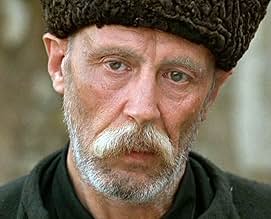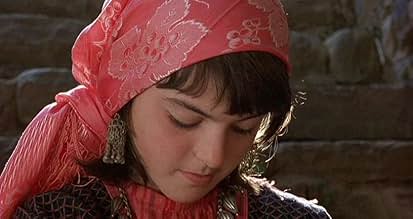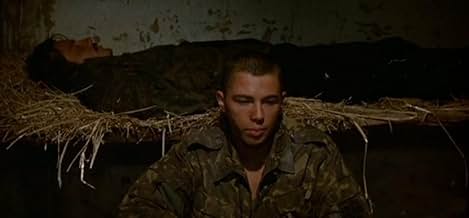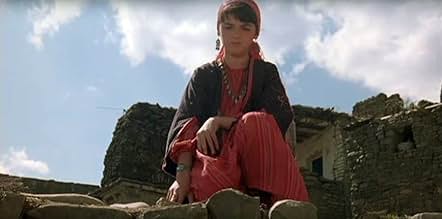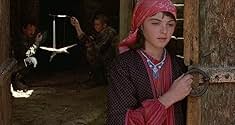IMDb रेटिंग
7.5/10
4.9 हज़ार
आपकी रेटिंग
अपनी भाषा में प्लॉट जोड़ेंTwo Russian soldiers, one battle-seasoned and the other barely into his boots and uniform, are taken prisoner by an anxious Islamic father from a remote village hoping to trade them for his ... सभी पढ़ेंTwo Russian soldiers, one battle-seasoned and the other barely into his boots and uniform, are taken prisoner by an anxious Islamic father from a remote village hoping to trade them for his captured son.Two Russian soldiers, one battle-seasoned and the other barely into his boots and uniform, are taken prisoner by an anxious Islamic father from a remote village hoping to trade them for his captured son.
- 1 ऑस्कर के लिए नामांकित
- 14 जीत और कुल 7 नामांकन
फ़ीचर्ड समीक्षाएं
Prisoner of the Mountains is an excellent movie. Vanya a young recruit , and Sasha a veteran soldier in the Russian army are captured after an ambush by the Chechens. The Chechen leader keeps them to trade for his son who is captured by the Russians. Then a friendship develops between the Chechens, and the two Russians. I study Russian in college, and even though the subtitles aren't very accurate at times it still helps. The whole plot is just amazing. It shows the human side of soldiers. I definitly recommend this movie to anyone who hasn't seen it.
10ekoronis
The simple story of two men captured an imprisoned in a small village develops actually to one of the most poetic and effective peace messages of our times. Based on stable and very well described characters and by the use of magical photography of a small village in Caucausus the movie helps us face the tragedy of war and the madness of human conflict as well.
The movie is about two Russians captured by the rebels, kept as hostages by an old man whose son is also in prison by the Russians. Since the old man wants to trade the two Russians with his son he insists that they must not be killed, he keeps them as a hope for his own tragical mission, to rescue his own son, despite the fact that other rebels want hostages killed. One of the Russians, actually a young and unexperenced soldier ends up respecting that small village. The relations among villagers and hostages, the deep human touch between the young Russian and the niece of the old man become the real story in the middle of the war.
The viewer confronts since the very beginning what war is about, the importance of human existence and life and the madness of human conflicts. Above all is life, creativity (the youg Russian repairs clocks), laugh and drink. While poverty and sadness reigns in the village tradition and human figures seem to survive. Those human values survive for a few moments before reality shows the cruel side of life once again. The movie is extremely poetic, images and folkloric scenes are well dressed with silent and simple russian music, silence and well developed scenes (the old man loading his son's dead body, the mother of the Russian and the old man meet each other as ennemies with the same feelings though as parenthood is above all wars, the young Russian is afraid to die).
Although the actors are not famous you will appreciate the natural talent of the actor playing the old man, a perfect tall-thin shape which dominates the screen. This movie is a must, a call of nature of humanism, a message which can't lose its modernity.
The movie is about two Russians captured by the rebels, kept as hostages by an old man whose son is also in prison by the Russians. Since the old man wants to trade the two Russians with his son he insists that they must not be killed, he keeps them as a hope for his own tragical mission, to rescue his own son, despite the fact that other rebels want hostages killed. One of the Russians, actually a young and unexperenced soldier ends up respecting that small village. The relations among villagers and hostages, the deep human touch between the young Russian and the niece of the old man become the real story in the middle of the war.
The viewer confronts since the very beginning what war is about, the importance of human existence and life and the madness of human conflicts. Above all is life, creativity (the youg Russian repairs clocks), laugh and drink. While poverty and sadness reigns in the village tradition and human figures seem to survive. Those human values survive for a few moments before reality shows the cruel side of life once again. The movie is extremely poetic, images and folkloric scenes are well dressed with silent and simple russian music, silence and well developed scenes (the old man loading his son's dead body, the mother of the Russian and the old man meet each other as ennemies with the same feelings though as parenthood is above all wars, the young Russian is afraid to die).
Although the actors are not famous you will appreciate the natural talent of the actor playing the old man, a perfect tall-thin shape which dominates the screen. This movie is a must, a call of nature of humanism, a message which can't lose its modernity.
Prisoner of the Mountains provides an inside look into the Russia/Chechnya conflict through the eyes of two captured Russian soldiers, Vania and Sacha. The unlikely duo forms a friendship out of their will to escape their imprisonment. Despite the serious basis for the story (the continuing war between the two countries), the film is very multifaceted in that it contains comedy, love, and suspense. In this respect, I greatly disagree with another user who described the film as `bleak, tedious, and uneventful.' The main reason this film succeeds is that it does not only focus on the war and battles between the two sides, but rather develops the underside of the conflict-the characters on both sides.
This user likens this film to watching polar bears sleeping because violence only makes up ten per cent of the plot. I have seen movies that are as boring as this analogy. Prisoner of the Mountains does not qualify as this type of film. Bodrov incorporates many different types of scenes in the plot action that evoke a variety of emotions from the audience. There are serious scenes, such as when Sacha and Vania are captured, which elicit fear and apprehension in the viewer. In contrast, there are also more humorous scenes, as in when Vania continues to meddle with the gun he and Sacha stole, after Sacha warns him to be careful, and the gun fires, causing them to lose their only bullet. In this respect, Bodrov makes his film very well-rounded by incorporating various types of scenes that play to different emotions. While the central plot is serious in its portrayal of the war, Bodrov includes less intense scenes in order make the film more interesting and develop the personalities of the characters. The scenes in which Vania and Sacha are shown `getting drunk, whittling, chatting with passers-by, and making friends with their captors' serve to help the audience understand the backgrounds of all of the characters, as well as show character transformation. Through discussions between the two soldiers, the audience discovers that Sacha's at first exterior most likely results from the fact that he is an orphan. In time, we see how Sacha grows to respect Vania, despite his naive nature, and becomes a father-figure to the younger soldier, ultimately sacrificing his life for him. Moreover, we learn how Dina grows fond of Vania and ultimately defies her father to help him escape. In this respect, these scenes are the main point of the movie. In this viewer's desire to see violence, I think he missed the obvious. Bodrov wants the viewer to understand the feelings and motivations of characters on both sides of the conflict. Had the film shown one battle after another, the audience would not have been able to understand the characters because only fighting would have been shown. In this respect, the non-violent scenes are critical to character development as well as the overall impact of the film on the audience.
While violence is the setting for the film, it is not meant to be the sole focus of the plot. Consequently, rating this film based on its lack of violence does not do it justice because violent scenes purposely comprise only a part of the action. This reaction would be similar to evaluating a straight play, which had a few musical numbers, as if it were a musical; you would obviously be let down and give it poor marks because your expectations would be too high. In this way, I do not feel that more violent scenes would have added anything to this film. Bodrov sought to illustrate the general tense atmosphere of the situation through the initial capture of the soldiers, the failed escape of the soldiers, the death of Abdoul's son and the expected shooting of Vania. These incidences of violence effectively convey the difficult environment to the audience. Additional killing would have been gratuitous in light of Bodrov's main emphasis of character development. Overall, I found this film to be incredibly engaging and interesting for its depiction of the bitter conflict between the two countries. As a westerner, I can say that the scenery was nice, but that it was not the only good aspect of the film as this viewer states. Perhaps the name and subject of this film is misleading. To a person who wants to see a lot of violence in films, Prisoner of the Mountains would not be my first recommendation. To this viewer, I would suggest The Betrayed, another film on the Russian/Chechnya conflict with significant violent footage. In forming impressions of films, it is important to take into consideration why the director made the film as he/she did. In this instance, it is clear that Bodrov did not only want to present the violent nature of the war, but that he desired to explore the individuals behind the conflict.
This user likens this film to watching polar bears sleeping because violence only makes up ten per cent of the plot. I have seen movies that are as boring as this analogy. Prisoner of the Mountains does not qualify as this type of film. Bodrov incorporates many different types of scenes in the plot action that evoke a variety of emotions from the audience. There are serious scenes, such as when Sacha and Vania are captured, which elicit fear and apprehension in the viewer. In contrast, there are also more humorous scenes, as in when Vania continues to meddle with the gun he and Sacha stole, after Sacha warns him to be careful, and the gun fires, causing them to lose their only bullet. In this respect, Bodrov makes his film very well-rounded by incorporating various types of scenes that play to different emotions. While the central plot is serious in its portrayal of the war, Bodrov includes less intense scenes in order make the film more interesting and develop the personalities of the characters. The scenes in which Vania and Sacha are shown `getting drunk, whittling, chatting with passers-by, and making friends with their captors' serve to help the audience understand the backgrounds of all of the characters, as well as show character transformation. Through discussions between the two soldiers, the audience discovers that Sacha's at first exterior most likely results from the fact that he is an orphan. In time, we see how Sacha grows to respect Vania, despite his naive nature, and becomes a father-figure to the younger soldier, ultimately sacrificing his life for him. Moreover, we learn how Dina grows fond of Vania and ultimately defies her father to help him escape. In this respect, these scenes are the main point of the movie. In this viewer's desire to see violence, I think he missed the obvious. Bodrov wants the viewer to understand the feelings and motivations of characters on both sides of the conflict. Had the film shown one battle after another, the audience would not have been able to understand the characters because only fighting would have been shown. In this respect, the non-violent scenes are critical to character development as well as the overall impact of the film on the audience.
While violence is the setting for the film, it is not meant to be the sole focus of the plot. Consequently, rating this film based on its lack of violence does not do it justice because violent scenes purposely comprise only a part of the action. This reaction would be similar to evaluating a straight play, which had a few musical numbers, as if it were a musical; you would obviously be let down and give it poor marks because your expectations would be too high. In this way, I do not feel that more violent scenes would have added anything to this film. Bodrov sought to illustrate the general tense atmosphere of the situation through the initial capture of the soldiers, the failed escape of the soldiers, the death of Abdoul's son and the expected shooting of Vania. These incidences of violence effectively convey the difficult environment to the audience. Additional killing would have been gratuitous in light of Bodrov's main emphasis of character development. Overall, I found this film to be incredibly engaging and interesting for its depiction of the bitter conflict between the two countries. As a westerner, I can say that the scenery was nice, but that it was not the only good aspect of the film as this viewer states. Perhaps the name and subject of this film is misleading. To a person who wants to see a lot of violence in films, Prisoner of the Mountains would not be my first recommendation. To this viewer, I would suggest The Betrayed, another film on the Russian/Chechnya conflict with significant violent footage. In forming impressions of films, it is important to take into consideration why the director made the film as he/she did. In this instance, it is clear that Bodrov did not only want to present the violent nature of the war, but that he desired to explore the individuals behind the conflict.
Like many other Russian films, the two main characters in `Prisoner of the Mountains' can be viewed as representative of the Russia that was and the Russia that is. Through their interactions with each other and the other characters in the movie, it is possible to draw conclusions about the state of the new Russia, the relationship between Old and New, and the problems and challenges that new Russia will face.
Ivan, the young, innocent Russian soldier represents the new Russia. He is open, accepting, inexperienced, and most importantly, he is not filled with hate. The second Russian soldier in the film, Sasha, is the old Russia. He is experienced in war and killing; as he puts it, he did not start out a killer, but he learned to love it over time. He was not always so callus, but grew so because of his environment. He is hard, cold, and firmly believes in the limits that race and ethnicity place on people. These two are both captured, and as they spend time living amongst their captors, both seem to form relationships and bonds with them. Sasha, however, only does this to gain their trust, and without a moments hesitation kills Hasan, the mute, with whom he spent so much time. Ivan, on the other hand, creates genuine bonds, truly finding love with the young girl. Ivan is not caught up with the fact that his feelings are taboo; his young heart and his open mind do not have room for hate.
Ivan is caught up in a war he has no part of; it is Sasha's war, not his. Because of the actions of Sasha, old Russia, the potential relationship between Ivan and the young girl, new Russia and Chechnya, is never realized. Ivan suffers because of the moves made on his behalf by the war mongering Sasha. Sasha has nothing to escape for, but he promises Ivan he will get him home. Sasha's method, however, only serves to worsen the situation. Even when Sasha is dead, it is too late for Ivan, the scars, distrust, and hatred run too deep to ever be mended, and new Russia is left dealing with the issues and hate it does understand that old Russia has left behind.
Ivan, the young, innocent Russian soldier represents the new Russia. He is open, accepting, inexperienced, and most importantly, he is not filled with hate. The second Russian soldier in the film, Sasha, is the old Russia. He is experienced in war and killing; as he puts it, he did not start out a killer, but he learned to love it over time. He was not always so callus, but grew so because of his environment. He is hard, cold, and firmly believes in the limits that race and ethnicity place on people. These two are both captured, and as they spend time living amongst their captors, both seem to form relationships and bonds with them. Sasha, however, only does this to gain their trust, and without a moments hesitation kills Hasan, the mute, with whom he spent so much time. Ivan, on the other hand, creates genuine bonds, truly finding love with the young girl. Ivan is not caught up with the fact that his feelings are taboo; his young heart and his open mind do not have room for hate.
Ivan is caught up in a war he has no part of; it is Sasha's war, not his. Because of the actions of Sasha, old Russia, the potential relationship between Ivan and the young girl, new Russia and Chechnya, is never realized. Ivan suffers because of the moves made on his behalf by the war mongering Sasha. Sasha has nothing to escape for, but he promises Ivan he will get him home. Sasha's method, however, only serves to worsen the situation. Even when Sasha is dead, it is too late for Ivan, the scars, distrust, and hatred run too deep to ever be mended, and new Russia is left dealing with the issues and hate it does understand that old Russia has left behind.
One might assume that the title refers only to the two Russian soldiers taken hostage by villagers in the Caucasus. But the Russian army has the village surrounded, so the townspeople are also prisoners. Moreover, each side is a prisoner of their own hate: the Russians can't see the villagers as humans and the villagers can't see the Russians as humans, thereby continuing the cycle of hate. Even the village elder is a prisoner of tradition: he uses a ceremonial knife for something in which he could have used a gun.
All in all, "Kavkazskiy plennik" (called "Prisoner of the Mountains" in English) is a very well done movie. Oleg Menshikov and Sergei Bodrov Jr. do very well with their roles, and the situation in Chechnya makes the movie all the more relevant.
All in all, "Kavkazskiy plennik" (called "Prisoner of the Mountains" in English) is a very well done movie. Oleg Menshikov and Sergei Bodrov Jr. do very well with their roles, and the situation in Chechnya makes the movie all the more relevant.
क्या आपको पता है
- ट्रिवियाThe film was shot within 20 miles of actual battles then occurring between Russians and Chechens. Local Muslim guerrillas served as bogyguards for the cast and crew. The film tells the story of two prisoners of war, but truth is stranger than fiction: when the guerrillas found out that amateur actress Susanna Mekhraliyeva was paid for her job in U.S. dollars they took the whole film crew prisoner! Her salary was soon changed for Russian rubles and the shooting continued as if nothing had happened.
- गूफ़After Sacha and Vanya escape and remove the shackles from their ankles, they begin running upstream. The scene cuts to a different angle, and they are running downstream.
- भाव
Sacha Kostylin: I am dead, but I like it. Everything is peaceful now.
- कनेक्शनFeatured in 54th Golden Globe Awards (1997)
टॉप पसंद
रेटिंग देने के लिए साइन-इन करें और वैयक्तिकृत सुझावों के लिए वॉचलिस्ट करें
- How long is Prisoner of the Mountains?Alexa द्वारा संचालित
विवरण
बॉक्स ऑफ़िस
- US और कनाडा में सकल
- $7,90,078
- US और कनाडा में पहले सप्ताह में कुल कमाई
- $17,205
- 2 फ़र॰ 1997
- दुनिया भर में सकल
- $9,21,886
इस पेज में योगदान दें
किसी बदलाव का सुझाव दें या अनुपलब्ध कॉन्टेंट जोड़ें




